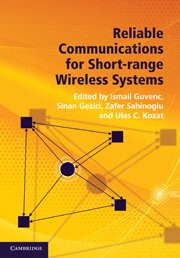Book contents
- Frontmatter
- Contents
- List of contributors
- 1 Short-range wireless communications and reliability
- Part I High-rate systems
- 2 High-rate UWB and 60 GHz communications
- 3 Channel estimation for high-rate systems
- 4 Adaptive modulation and coding for high-rate systems
- 5 MIMO techniques for high-rate communications
- Part II Low-rate systems
- Part II Selected topics for improved reliability
- Index
3 - Channel estimation for high-rate systems
from Part I - High-rate systems
Published online by Cambridge University Press: 01 June 2011
- Frontmatter
- Contents
- List of contributors
- 1 Short-range wireless communications and reliability
- Part I High-rate systems
- 2 High-rate UWB and 60 GHz communications
- 3 Channel estimation for high-rate systems
- 4 Adaptive modulation and coding for high-rate systems
- 5 MIMO techniques for high-rate communications
- Part II Low-rate systems
- Part II Selected topics for improved reliability
- Index
Summary
In this chapter, we consider the channel estimation issue in orthogonal frequency division multiplexing (OFDM)-based short-range high-rate wireless communication systems. Even though a number of channel estimation schemes have been proposed for various OFDM systems, few of them are practically suitable for use in the ECMA-368 ultrawideband (UWB) and 60 GHz millimeter-wave communication systems in which limitations on cost and reliability are generally stringent [1, 2]. The main goal of this chapter is to summarize and compare existing channel estimation techniques and to identify an efficient candidate for the practical implementation of low-cost and ultrareliable short-range wireless communication devices.
This chapter begins with an introduction of channel modelling in Section 3.1. Time-dispersive or frequency selective channel propagation characteristics are studied based on the clustering property of multipath components (MPCs). In Section 3.2, several existing channel estimation schemes are reviewed with the focus on those based on training sequences with a block-type structure. Least-squares (LS), linear minimum mean-squared error (LMMSE) and maximum-likelihood (ML)-based algorithms are highlighted followed by a detailed description of a multistage channel estimator. We compare these estimators in terms of their mean-squared error (MSE) performance and complexity for ECMA-368 UWB applications, and show that the multistage channel estimator strikes desirable performance–complexity tradeoffs. Section 3.3 is devoted to studying the impact of channel estimation errors on the system performance. Analysis and numerical examples show that, in terms of symbol error rate (SER) and frame error rate (FER), the multistage channel estimator substantially outperforms the conventional LS approach and it performs comparably to the ML estimator, under various highly noisy multipath channel conditions.
- Type
- Chapter
- Information
- Reliable Communications for Short-Range Wireless Systems , pp. 61 - 92Publisher: Cambridge University PressPrint publication year: 2011

